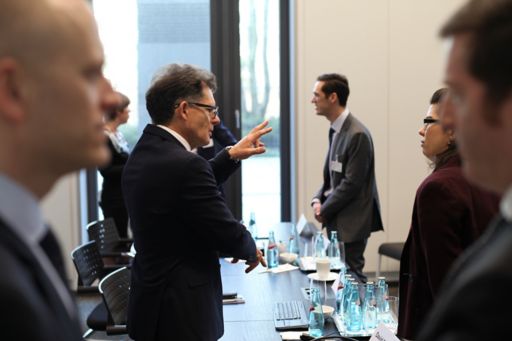Responding to a connected, data-driven business environment: Stakeholder perspectives
Our world has become increasingly interconnected, driven by the digital technologies that are shaping how businesses and individuals alike interact and communicate.
But what impact might this have on the audit and corporate reporting? We saw in our summary of auditor discussions (PDF 526 KB) that KPMG audit leaders are in no doubt that data analytics and new and emerging capabilities, such as cognitive technologies and artificial intelligence (AI), have an enormously significant role to play — bringing deeper analysis of ever wider data sets, a powerful focus on risks and anomalies, and new insights for audit committees.
Audit firms are also creating new, more interactive workflows through which to conduct audits that enable more continuous communication with clients on a real-time basis — such as our KPMG Clara platform.
Technology taken as a given?
However, in the discussions that KPMG hosted with investors, audit committees, regulators and other stakeholders across multiple locations, there was perhaps surprisingly little discussion of how or whether the audit was harnessing new technology. Perhaps stakeholders regard that as a given or as an internal matter for audit firms to get to grips with.
Nevertheless, there was a recognition and an expectation that corporate reporting itself will change significantly in the coming years as technology advances. Technology can help create greater connectivity across different strands of reporting so that investors and other stakeholders are getting more insightful information.

If there was only limited discussion of technology itself, there was, however, a recurring focus on the innovations that are needed to drive improvements.
One of these was Integrated Reporting (IR). Several participants signalled their support for IR, with some saying it has changed how their organization reports and understands its own business.
A more joined-up view through IR
This is likely to be a continuing area of development as companies look to provide a more joined-up view of their organization and its operations. It is something that investors would welcome. Many see a need for more and better non-financial reporting to marry with financial reporting and provide a more complete picture of an organization’s story and performance.
With this comes the question of the extent to which auditors might broaden their scope in the future to give assurance over a wider set of information, including non-GAAP financial measures and also non-financial KPIs.
Clearly, auditors could be well-placed to provide assurance over processes and systems collected within non-financial and non-GAAP reporting and whether any adjustments that companies are making are justifiable.
Many discussion participants seemed open to the possibility of auditors providing such assurance. However, for some, and especially on the corporate side, there was concern that auditors should not broaden their scope too far, for fear of distracting them from their core role of auditing the financial statements themselves
Expanded auditor reports
There was, however, plenty of support for the expanded auditor reports that have been introduced in a growing number of countries, extending the report beyond a binary pass/fail and giving more insight into key audit judgments and considerations.
These have generally been welcomed as a positive innovation that gives investors a better understanding of a company. The challenge here, as some said, will be to avoid the reports lapsing into sameness as time passes — a form of ‘new boilerplate’.
Clearly, innovation and change are very much on the agenda for all parties. How this could develop in the coming years is likely to be an area of fascinating discussion in the next phase of our Value of Audit program.
All references to 'KPMG', 'us' and 'we' refer to KPMG's network of member firms.
Connect with us
- Find office locations kpmg.findOfficeLocations
- kpmg.emailUs
- Social media @ KPMG kpmg.socialMedia
